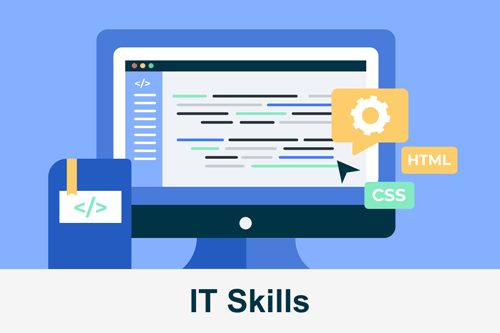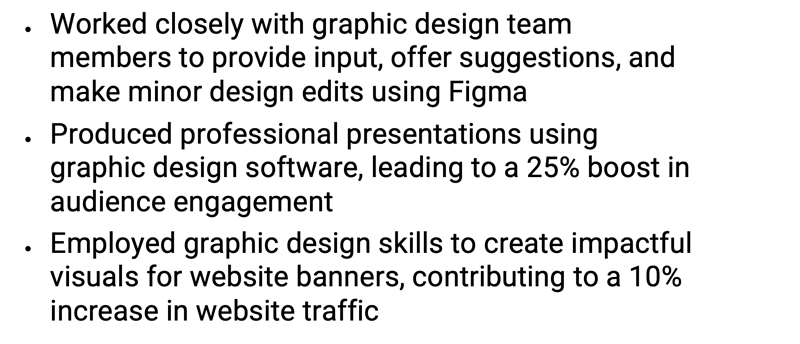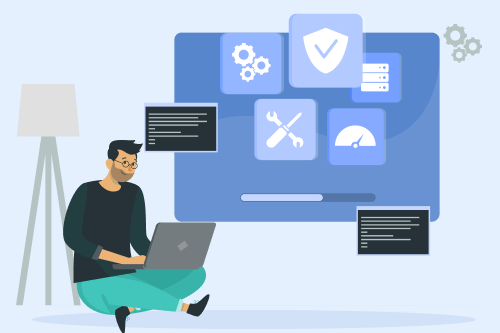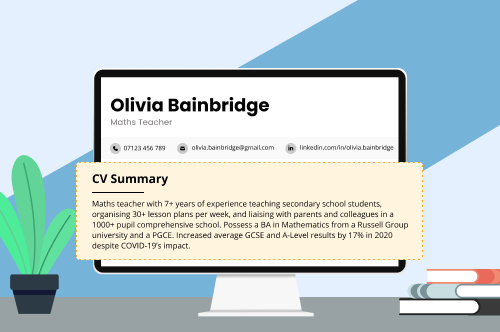Information technology (IT) skills (aka computer skills) are abilities you use to work with technology like computer hardware and software, automation, and the internet.
Almost every job requires at least basic IT skills. And if you’re dedicating your career to IT, you’ll need more advanced ICT skills on your CV too. Read on to learn about these key computer skills, how to put IT skills on your CV, and answers to common questions about IT skills.
Top IT skills for 2024
The UK is facing a shortage of skilled IT workers, so IT skills are in high demand, especially the following:
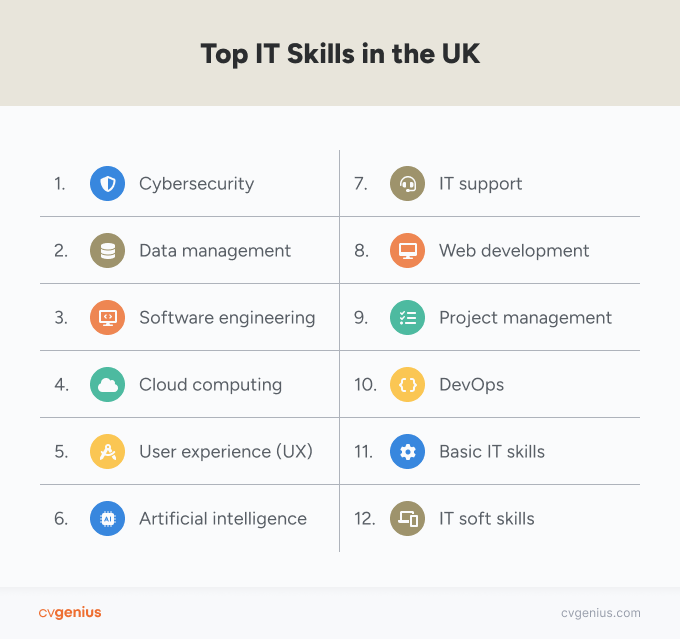
Basic computer skills
Here are the top 7 basic computer skills everyone needs to get hired in 2024, along with some ways to present these skills on your CV:
- Word processing
- Spreadsheets
- Social media
- Graphic design
- Cloud computing
- Communication software
1. Word processing
Word processing software is anything that makes text documents. The most common software packages are Microsoft Word, which you can install on your computer or use online, and Google Docs, which is exclusively an online program.
Other word processing software you might know how to use are:
- Apple Pages
- LibreOffice (formerly called OpenOffice)
Employers expect you to be able to use word processing software to create all kinds of documents, from memos and letters to reports and draft marketing materials.
One way of showing employers you know how to use word processing software is by demonstrating you know how to write a good CV (although there’s no harm in using a CV template or CV maker to speed the process up).
You should be able to use word processing software to effectively:
- showcase your written communication skills
- format documents (think margins, fonts, font sizes)
- collaborate to make changes to documents (for example, using suggesting mode on Google Docs)
Here are some example CV work experience bullet points that give you an idea of how you can prove your word processing skills:
- Took minutes at 100+ meetings of the senior executive team
- Effectively used word processing software to prepare and update patient records, ensuring 100% accuracy in record-keeping
- Utilised advanced features of word processing software to optimise keyword-rich content for SEO purposes, leading to a 30% increase in website traffic and improved search engine rankings
2. Spreadsheets
You’ll use spreadsheets to crunch numbers, keep track of budgets, and create informative graphs. The most popular examples of spreadsheet software are Microsoft Excel and Google Sheets.
Here are some example bullet points to show employers you’re capable of using spreadsheet software:
- Created and maintained inventory spreadsheets, resulting in a 20% reduction in supply shortages and ensuring timely restocking of essential veterinary supplies
- Managed employee schedules using spreadsheet software, optimising staff allocation and ensuring efficient usage of resources, leading to a 47% decrease in scheduling conflicts
- Developed and maintained customer contact lists using spreadsheet software, resulting in streamlined communication processes and a 25% improvement in response time to customer inquiries
3. Social media
Social media includes platforms like:
Employers are looking for applicants who know how to use social media platforms due to their importance in modern communication and marketing.
Proficiency in social media demonstrates digital literacy and the ability to engage with customers, create successful campaigns, analyse data, and stay updated in the digital landscape, providing a competitive edge to your application, especially if you’re writing a social media CV or a marketing CV.
Here are some example bullet points to inspire you as you write about your social media skills:
- Grew TikTok following by 17% by creating, uploading, and sharing 100+ short videos featuring our products
- Managed social media advertising budget of £10,000, achieving a 25% increase in conversion rates and generating £50,000 in revenue through targeted ad campaigns
- Implemented a content calendar and posting schedule, resulting in a consistent 20% increase in social media engagement
4. Email
You’ll need to use email to communicate with your colleagues, connect to clients, and liaise with external vendors.
The most popular email service is Gmail but you might also need to use Outlook, AOL, or Yahoo.
Here’s what to include in a CV to display your email skills:
- Managed a high volume of incoming emails, maintaining a response time of less than 24 hours and achieving a 95% customer satisfaction rating
- Organised and streamlined email communication by implementing email management tools and strategies, resulting in a 30% reduction in email backlog and increased team efficiency
- Developed and executed an email marketing campaign that achieved an open rate of 25% and a click-through rate of 15%
5. Graphic design
Graphic design skills can come in handy even if you’re not a graphic designer. For example, you can provide mockup designs to full-time graphic designers, make your own basic graphics, or make quick edits to images you already have.
Some of the key graphic design software you might be expected to use include Figma, InDesign, and Photoshop.
Here are some graphic design work experience bullet points to inspire you:
6. Cloud computing
Cloud computing refers to using web services to create, modify, and distribute work files. Commonly used tools are Google Drive, Dropbox, and Apple iCloud.
Here’s how to show your cloud computing skills on your CV:
- Used Dropbox to securely store and retrieve critical data, ensuring data availability and disaster recovery preparedness with a 99.9% uptime record.
- Streamlined team collaboration by implementing Google Drive, resulting in a 40% reduction in email attachments
- Utilised cloud-based customer service platforms, such as Salesforce Service Cloud and Zendesk, to efficiently manage customer inquiries, resulting in a 20% decrease in response time
7. Communication software
The number of people working fully or partly from home has increased, and employers expect you to remain in touch by using communication tools like Slack and Microsoft Teams.
This software allows you to send messages, make calls, and share documents and other files with your colleagues.
Employers need employees who can use instant messaging software like Slack or Microsoft Teams to communicate quickly, collaborate effectively, and share information in real-time, leading to improved productivity and teamwork.
Make your CV eye-catching by including bullet points that prove you’re capable with communication software. Here are some examples to get you started:
- Organised and participated in 50+ virtual meetings and discussions using Slack
- Effectively utilised Microsoft Teams in teaching environments, fostering real-time student engagement and communication to provide 50+ hours of one-on-one tutoring
- Proficiently used Microsoft Teams as a security guard, enabling quick communication with team members in emergency situations and timely response to incidents
Advanced skills for IT CVs
If you’re writing a CV for an IT job, you’ll need to detail more specific, advanced IT skills on your CV. Here are 10 computing skills you need for careers in IT (along with examples of these skills on a CV):
1. Cybersecurity
Almost all businesses rely on the Internet and other digital methods to store information. Showing employers that you understand cybersecurity is essential (and especially so if you’re writing a cybersecurity CV) because doing so lets them know you’ll protect their data and help prevent breaches of the Data Protection Act or cyberattacks.
Here are IT skills related to cybersecurity:
- Scripting
- Risk analysis
- Controls and framework
- Intrusion detection
- Network security control
- Operating systems
- Incident response
- Security auditing
Examples of cybersecurity skills on a CV
- Developed and implemented comprehensive data security protocols, leading to a 45% improvement in system integrity and a 30% reduction in data breaches
- Conducted regular security audits, vulnerability assessments, and penetration testing, identifying and addressing potential risks and implementing corrective actions, which resulted in a 25% decrease in security incidents
2. Data management
Companies are increasingly expanding efforts to capture, store, and analyse large volumes of structured or unstructured data. Mastering this IT skill and including it on your CV demonstrates your ability to be highly organised, save on business costs, and improve efficiency at your target workplace.
Try including these skills if you’re applying for data management-related work:
- Data modelling, analysis, and visualisation
- Data storage and management (using databases and data warehouses)
- ETL (extract, transform, load) processes
- Data processing and computation (using programming languages such as Python or SQL)
- Data visualisation tools (Tableau, Excel, D3.js)
Examples of data management skills on a CV
- Facilitated data-driven responses to business needs and challenges by implementing advanced data categorisation and analytics techniques, resulting in enhanced data accuracy and a 20% reduction in data retrieval times
- Spearheaded the design and maintenance of a robust data management infrastructure, optimising data quality, reliability, and accessibility, producing a 35% increase in operational efficiency
3. Software engineering
Your software engineering skills are highly valuable in the UK in 2024. So ensure you list them if you’re applying for an IT role or writing a software engineering CV.
These are some software engineering–related IT skills:
- Programming and coding
- Object-oriented design (OOD)
- Understanding mathematical concepts
- Workflow development
- Debugging
Examples of software engineering skills on a CV
- Led the design and implementation of a scalable microservices architecture, improving system resilience by 40%
- Collaborated cross-functionally to optimise and refactor legacy code, achieving a 25% increase in application performance and reducing bug occurrence by 50%
4. User experience (UX)
IT professionals understand the importance of providing an excellent user experience (UX) for anyone using their company’s products or services. Adding examples on your CV of times you’ve worked with users on a product or collaborated with design teams will show employers you have a solid understanding of this concept.
Some UX-related skills include:
- Product design
- Knowledge of information architecture and interaction design
- Wireframing and prototyping
- Using visual design software
Examples of UX skills on a CV
- Conducted comprehensive user research, developed personas, mapped user journeys, and iteratively tested prototypes, resulting in a 30% increase in user engagement.
- Facilitated workshops and design thinking sessions to bring about the successful launch of three customer-centric applications, garnering positive user feedback and achieving a Net Promoter Score (NPS) increase of 20 points
5. Artificial intelligence (AI)
Employers often seek applicants who have a strong understanding of artificial intelligence (AI) and can prepare IT systems for future changes. So if you can, include examples of what you’ve learnt about AI services or when you used AI software in a work setting.
These are other AI-related skills to put on your CV:
- Predictive analytics
- Robotics and automation
- Natural language processing techniques
- Signal processing techniques
Examples of AI skills on a CV
- Self-studied and attended a conference on AI, acquiring a solid understanding of basic AI concepts and principles, including machine learning and natural language processing
- Successfully implemented machine learning, natural language processing, and computer vision solutions, leading to a 35% improvement in organisational productivity and a 25% increase in customer satisfaction
6. IT support
Having a team of skilled IT support professionals is important to employers, so show you have a solid understanding of technology by providing examples of when you’ve resolved technical issues for other teams or clients.
Here are some IT support-related skills:
- Experience with troubleshooting and resolving technical issues
- Knowledge of computer systems and networks
- Customer service and communication skills
- Ability to explain technical concepts to non-technical users
Examples of IT support skills on a CV
- Leveraged comprehensive knowledge of IT systems, software, and hardware to provide prompt and efficient support to end-users, achieving a 95% customer satisfaction rating
- Developed and facilitated user training sessions on software applications and IT best practices, empowering users to use technology effectively and reduce the frequency of helpdesk inquiries
7. Web development
The demand for digital services is higher than ever, so having web development skills gives you many options for work. These CV skills show you can help companies successfully interact with customers and clients:
- HTML and CSS
- React
- Kotlin
- Ruby on Rails
- Node JS
- Javascript
- PHP
- C#
Examples of web development skills on a CV
- Expertly developed and deployed responsive and scalable web applications using a diverse tech stack including HTML, CSS, JavaScript, React, and Node.js
- Implemented performance optimisations and SEO best practices, resulting in a 50% increase in page load speed and a 30% boost in organic web traffic for client websites
Curious what coding languages are in demand this year? Check out the most useful programming languages for 2024 in our TikTok below:
@resumegenius Which programming language is the most useful? #programming #coding #programmer #programmerlife ♬ Coding – Instrumental Music From TraxLab & Chillout Lounge From I’m In Records & Background Music & Sounds From I’m In Records
8. Project management
Project management involves organising and coordinating the development and delivery of IT projects within a company. IT projects can be complex and involve multiple stakeholders, budgets, timelines, and resources, so effective project management is crucial for ensuring successful completion.
Here are some skills to help you improve your project management skills or write an IT-specific project manager CV:
- Using project management methodologies and frameworks (like Agile, Lean, Prince2, and Waterfall)
- Proficiency in project management software (Microsoft Project, Trello, Notion, Asana, and Salesforce)
- Scrum management
- Performance tracking
- Project life cycle management
Examples of project management skills on a CV
- Successfully led and executed multiple high-impact projects from conception to completion, using a balanced approach of Agile and Waterfall methodologies and generating £4 million in revenue
- Fostered a collaborative and transparent working environment by organising regular team meetings, workshops, and one-on-one sessions
9. DevOps
DevOps is a top skill for companies in 2024 and is crucial in a competitive business environment because it allows organisations to continuously improve and deliver software. Skills needed for DevOps include:
- Automation tools (Jenkins, Puppet)
- Configuration management tools (such as Ansible and Terraform)
- Programming frameworks and languages (Bash, Go)
- Containerisation technology knowledge (Docker, Kubernetes)
- Monitoring and logging tools (like Grafana and Splunk)
- Agile software development methodology
Examples of DevOps skills on a CV
- Led the integration and optimisation of Continuous Integration/Continuous Deployment (CI/CD) pipelines, using tools such as Jenkins, Docker, and Kubernetes
- Automated build, test, and deployment processes, reducing release times by 40% and minimising manual errors
10. IT soft skills
No matter how technical your job is, you’ll need good IT soft skills to have a successful career in information technology. For instance, even if you work remotely as an IT consultant or contract developer, you’ll need to communicate well with project managers and negotiate fair payment.
Below are more soft skills to highlight when you write your CV to improve your chances of getting hired in the IT industry:
- Interpersonal skills
- Focus
- Critical thinking skills
- Customer service skills
- Curiosity
- Leadership skills
- Management skills
- Reliability
- Growth mindset
- Conflict management
- Time management
- Communication skills
- Logical thinking
- Problem-solving
Examples of IT soft skills on a CV
- Demonstrated ability to convey complex technical information in a clear and understandable manner to non-technical users, enhancing user experience and satisfaction
- Exhibited strong problem-solving skills, proactively identifying and addressing challenges, and implementing practical solutions to ensure seamless IT operations and support
How to list IT skills on your CV
Here’s how to list IT strengths on your CV in three quick steps:
1. Determine which of your IT skills the employer values most
The best way to get your target employer’s attention with your IT skills is by listing the ones they noted in their job advert. These are the IT skills that the company needs the most, so if you can show that you’ve got them on your CV, you’re more likely to get an interview.
You can also give yourself an advantage over other applicants by researching the company’s website, social media, and other internet presence to find other ways your IT skills can help them solve problems or achieve goals.
2. Give examples of your IT skills with hard numbers
Just listing IT skills from the job advert and your research on the company isn’t enough. You must also show how you’ve used those skills to produce results by providing examples and data.
Describing your IT skills with examples and data helps the employer picture what you can do if they hire you.
Here’s a well-written work experience bullet point with a clear example and hard numbers that provide context:
- Implemented a cloud-based storage solution, leading to a 50% reduction in data retrieval times and enhancing the productivity of 200+ end-users
3. Spread your IT skills throughout your CV
Put the most job-relevant examples of your IT skills and accomplishments in your CV personal statement, a brief summary of your CV that goes under your name and contact details. This is the first part of your CV that employers will read, so placing your most job-relevant information there is critical to your application’s success.
But don’t stop there. Continue describing your IT skills in the rest of your CV sections, including your:
- work experience section
- education section
- skills section
- hobbies & interests
To see what adding IT skills to every section of your CV looks like, take a look at the IT CV example below.
IT skills CV example
Here’s an IT skills CV example. You can download the CV for Microsoft Word and use it as a guide for your own CV, or copy the text version below and paste it:
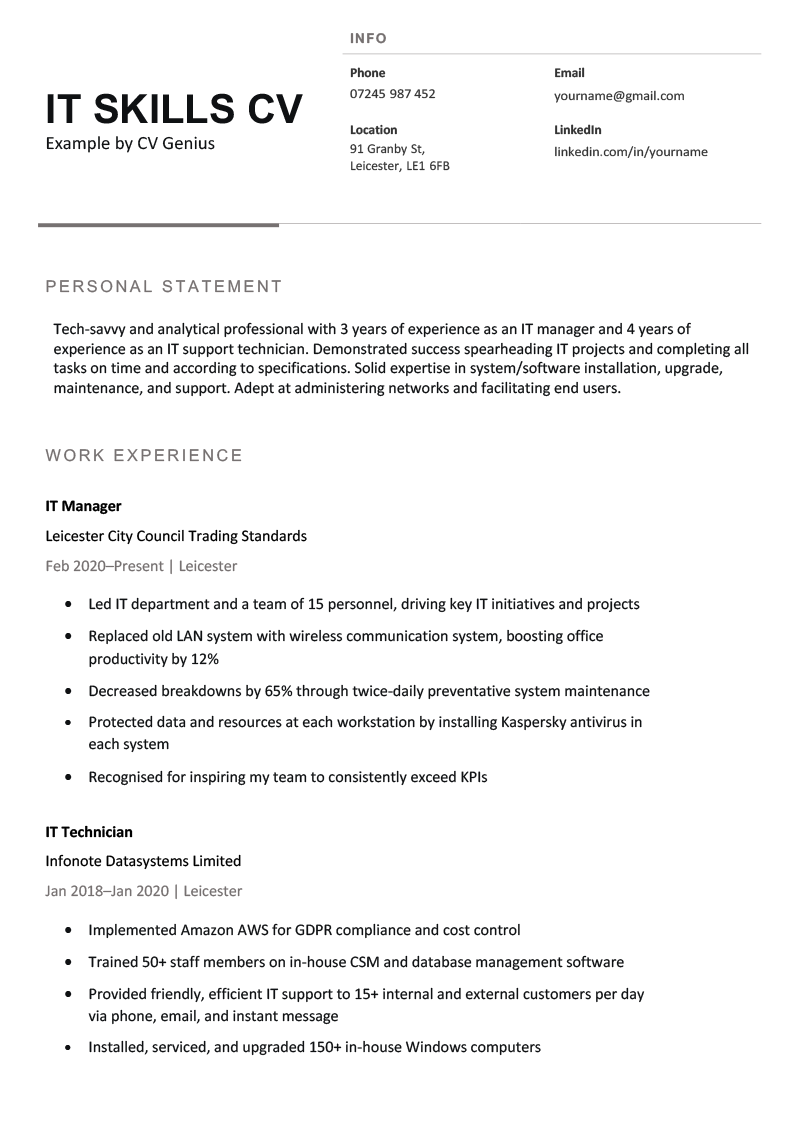
Download Free IT CV Skills Example
IT Skills CV Example (Text Version)
YOUR NAME
Phone: 07123 456 789 Email: your.name@email.com Address: Your Town, Postcode LinkedIn: www.linkedin.com/in/your.name
PERSONAL STATEMENT
Tech-savvy and analytical professional with 3 years of experience as an IT manager and 4 years of experience as an IT support technician. Demonstrated success spearheading IT projects and completing all tasks on time and according to specifications. Solid expertise in system/software installation, upgrade, maintenance, and support. Adept at administering networks and facilitating end users.
WORK EXPERIENCE
IT Manager
Leicester City Council Trading Standards
Feb 2020–Present | Leicester
- Led IT department and a team of 15 personnel, driving key IT initiatives and projects
- Replaced old LAN system with wireless communication system, boosting office productivity by 12%
- Decreased breakdowns by 65% through twice-daily preventative system maintenance
- Protected data and resources at each workstation by installing Kaspersky antivirus in each system
- Recognised for inspiring my team to consistently exceed KPIs
IT Technician
Infonote Datasystems Limited
Jan 2018–Jan 2020 | Leicester
- Implemented Amazon AWS for GDPR compliance and cost control
- Trained 50+ staff members on in-house CSM and database management software
- Provided friendly, efficient IT support to 15+ internal and external customers per day via phone, email, and instant message
- Installed, serviced, and upgraded 150+ in-house Windows computers
IT Support Technician
Landmark Offices
May 2016–Jan 2018 | Leicester
- Delivered quality IT support and system troubleshooting services to 5,000+ end users
- Performed 15+ on-site visits in a week to develop partner solutions
- Identified and resolved customer issues daily with a success rate of 98%
- Reduced solution delivery time by 45% by implementing a help desk ticket system
- Helped network team with monitoring of four Linux-based network servers
EDUCATION
Bachelor of Science (Hons.) in Information Technology
University of Strathclyde
2012–2016, Glasgow
Relevant Modules
Networking & Internet Environment, Programming, Computer Fundamentals, C Programming, Data Structure, Web Programming, Computer Graphics, Computer Networks, Object-Oriented Programming, Software Testing, Internet Security
KEY SKILLS
- Enterprise IT infrastructure
- Database management
- Software development
- Computer hardware
- Excellent interpersonal skills
- Conflict resolution
HOBBIES & INTERESTS
- Vlogging about the tech industry
- Salsa Dancing
- Marathon Running
Frequently asked questions about IT skills
Still unsure how to write a CV that showcases the right IT skills? We’ve answered four of the most common questions about IT skills, covering:
- how to improve your IT skills
- why IT skills are important
- what skills will improve your chances of getting a job
1. How can I improve my IT skills?
You can improve your IT skills by:
- getting an IT-related degree at your uni
- taking an IT internship
- enroling in online IT courses (the National Careers Services website has a big list of great IT self-study sites)
- reading books and articles about technology
2. Why are IT skills important?
IT skills are important in 2024 and beyond because the world is increasingly run by technology.
As 1.4 million UK jobs are at risk of automation in the next year and virtual reality is opening up new opportunities for interaction, you can adapt by improving your IT skills.
3. What IT skills would improve my chances of getting a job?
These IT skills will improve your chances of getting a job, depending on the field you work in:
- Online communication skills
- Ability to learn technical information quickly
- Advanced spreadsheet skills
- Google Analytics skills
- Troubleshooting
- Device setup
Giving examples of these IT skills on your CV will help you get hired because they show you have a strong foundation of technical skills that employers can build on.
Other FAQs related to putting IT skills on your CV
Here are some answers to additional FAQs to help you write about IT skills on your CV:
Remember to also highlight your IT skills when you make a cover letter.
